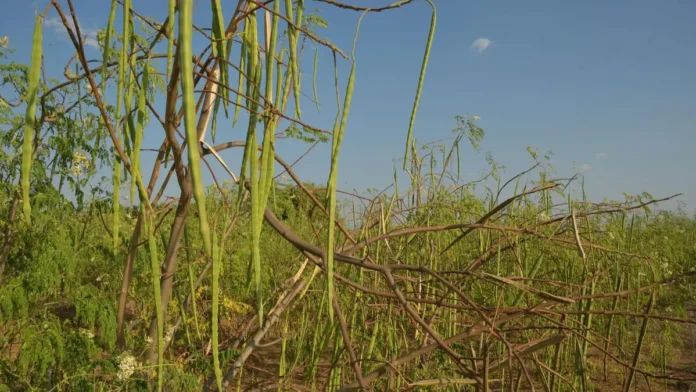India, the land of diverse cultures and traditions, is also known for its rich agricultural heritage. Among the many crops grown in the country, one particular plant has been gaining popularity in recent years – the moringa tree. Moringa, also known as the ‘miracle tree’, is a highly nutritious plant that has been used for centuries in traditional medicine. Today, India is the leading producer of moringa, meeting 80% of the world’s demand, with Tamil Nadu being the top producer.
Moringa is a fast-growing, drought-resistant tree that is native to the Indian subcontinent. It is known for its high nutritional value, with every part of the tree being edible and beneficial. The leaves, which are rich in vitamins and minerals, are used in cooking and as a dietary supplement. The seeds, which are a good source of protein and healthy fats, are used to make oil. The roots, bark, and flowers also have medicinal properties and are used in traditional medicine.
India’s moringa production has been steadily increasing over the years, and today, the country is the largest producer and exporter of moringa in the world. According to the Food and Agriculture Organization (FAO), India produced 1.3 million tonnes of moringa in 2019, accounting for 80% of the global production. Out of this, Tamil Nadu alone produced 500,000 tonnes, making it the top producer in the country.
So, what makes Tamil Nadu the leader in moringa production? The state’s agro-climatic conditions, coupled with the government’s initiatives and the efforts of farmers, have contributed to this success. Tamil Nadu has a tropical climate, with hot and humid summers and mild winters, which is ideal for the growth of moringa. The state also has a well-developed irrigation system, making it possible to grow moringa throughout the year.
The state government has also taken several initiatives to promote moringa cultivation in Tamil Nadu. In 2018, the government launched the ‘Moringa Mission’ to increase the production of moringa and promote its consumption. Under this mission, the government provides subsidies and incentives to farmers to encourage them to grow moringa. The government also conducts training programs and workshops to educate farmers about the benefits of moringa and the best practices for its cultivation.
The efforts of the government, along with the hard work of farmers, have resulted in a significant increase in moringa production in Tamil Nadu. The state has also adopted modern farming techniques, such as drip irrigation and organic farming, to improve the quality and yield of moringa. This has not only benefited the farmers but also the consumers, as they get access to high-quality, organic moringa products.
Apart from meeting the domestic demand, Tamil Nadu also exports moringa to various countries, including the United States, Europe, and Japan. The demand for moringa is increasing globally, as people are becoming more health-conscious and are looking for natural and nutritious alternatives to supplements. This has opened up new opportunities for Indian farmers, and they are making the most of it by increasing their moringa production.
The success of Tamil Nadu in moringa production has not only boosted the state’s economy but also contributed to the country’s overall growth. Moringa cultivation has provided employment opportunities to many people, especially in rural areas, where agriculture is the primary source of livelihood. It has also helped in reducing malnutrition, as moringa is a rich source of essential nutrients and is affordable for all.
In conclusion, India’s dominance in the global moringa market is a testament to the country’s agricultural prowess. Tamil Nadu, with its ideal climate and government support, has emerged as the top producer of moringa in the country. The state’s success story is an inspiration for other states to promote moringa cultivation and contribute to the country’s growth. With the increasing demand for moringa, India has the potential to become the world’s largest producer and exporter of this ‘miracle tree’.


